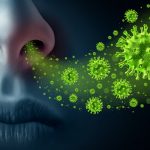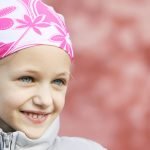The Bad: Severe Acute Respiratory Syndrome
SARS (severe acute respiratory syndrome) was first reported in Hong Kong several months ago, although it’s now known that it actually first appeared in China proper as far back as last November/December. Early indications are that it’s probably caused by a virus, the coronavirus, named for its corona-like appearance. Coronaviruses are second only to rhinoviruses as a cause of the common cold. Infection tends to remain localized in epithelial cells (nasal passages, throat, etc.) due to the optimum growth temperature of the virus, around 980 F (350 C). The mortality rate among those affected by SARS is currently running at about 4%.
(Note: In Canada, health officials said the coronavirus identified by the WHO as causing SARS might not be the only cause of the disease. “We have only identified the coronavirus in 50 percent of the people being treated for SARS,” Health Ministry spokesman Paul Gully said. “We have a slightly less optimistic vision than the WHO and it is still too early to talk of a medicine or a vaccine that might slow the spread of the disease.”)
At first, it was assumed that all SARS infections happened as the result of direct contact with a person showing symptoms of the disease (high fever and a dry cough). However, it is now understood that transmission might occur not only through droplets expelled by coughing, but through air-conditioning systems, water pipes or contaminated surfaces such as elevator/lift buttons. (Hardy coronaviruses can survive outside the human body for three to six hours.) This has caused panic as SARS has spread with cases now appearing throughout the world including Canada and the US.
To date, according to the World Health Organization, some 3,800 cases of SARS with 212 deaths have been reported in 25 countries. Hong Kong has had 88 deaths, followed by mainland China with 86 deaths, Singapore with 16, Canada with 14 and Vietnam with 5.
The Good: The Virus
First of all, for most people, SARS is not much different than the flu. Fever, chills, body ache, and cough are the most frequent complaints. In general, symptoms are fairly mild. It is only when patients are already in a weakened state (the very old, the very young, people with lymphopenia and liver dysfunction, etc.) that the symptoms have been severe, resulting in death for some of those patients.
Although, a 4% mortality rate is high, it’s far from the 80% mortality rate of diseases such as the Ebola virus. Also, to help give you some perspective, in the January 8th issue of the Journal of the American Medical Association, CDC data was released that shows some 36,000 people die each year from the flu in the United States. Think about that for a moment: 36,000 deaths each year from flu in the United States versus 212 deaths worldwide from SARS. Which should you be more concerned about?
The Bizarre: Life Changing
Despite the fact that SARS has killed so few people, it is changing life as we know it. Ordinary life in Hong Kong, for example has changed beyond recognition. Restaurants are empty, but supermarkets are full, as people stock up with rice, instant noodles, toilet paper and disinfectant. Streets in the business district, normally bustling, are eerily quiet. Rush hour is gone, as people try to take public transportation at unusual hours. And the sight of people going about their daily business wearing facemasks is eerily omnipresent.
Authorities have just forced all 2,400 workers of Singapore’s biggest wholesale vegetable market into quarantine after three people linked to the market came down with SARS. Any stall holder or market employee who disobeys the quarantine will be fined or imprisoned. Dozens of police in masks cleared the market and put up barricades to keep people out. The net result is that Singapore’s produce supplies have been thrown into turmoil for at least the next ten days. The fear is that the virus has escaped from hospitals and spread into Singapore’s broader community.
And then there are the airlines. As if things weren’t already bad enough because of the recession and the fall out from 9/11, SARS has caused a further 30% reduction in travel to and from Asian countries. Major airlines are being driven to the edge of bankruptcy — and beyond.
In the end, SARS may be remembered more for its economic and psychological impact then from its actual health impact.
What to do with your Immune System
You want to regularly consume antivirals such as garlic/onion extracts because the SARS infection comes on so quickly and you get so sick so fast that waiting to take antivirals until after you notice symptoms will be less effective. If you do wait until after symptoms appear, you may want to add additional anti-pathogens such as olive leaf extract and/or colloidal silver. (Note: if you use olive leaf and/or colloidal silver, you will also want to take a good full spectrum probiotic supplement to rebuild the beneficial bacteria in your intestinal tract.)
Keep your immune system optimized to prevent the virus from taking hold – but with one important caveat.
- The reason that most SARS fatalities have occurred in those with compromised health is that much of the damage from SARS results from the overwhelming chemical counterattack by the immune system. This cytokine storm, as it’s called, is intended by your body to kill the virus; but in people in a weakened state, it can cause inflammation, leaky blood vessels and even pneumonia, a hallmark of SARS.
- The Baseline of Health program is tailor made for this kind of problem because it is designed to optimize the health of all major systems in your body simultaneously, thereby allowing you to benefit from the virus killing action of the cytokine storm, without succumbing to its side effects. For more information on the Baseline of Health, be sure and read Lessons from the Miracle Doctors. If you have not already done so, you can download a free copy under the “Jon Barron Book” section of this site.










